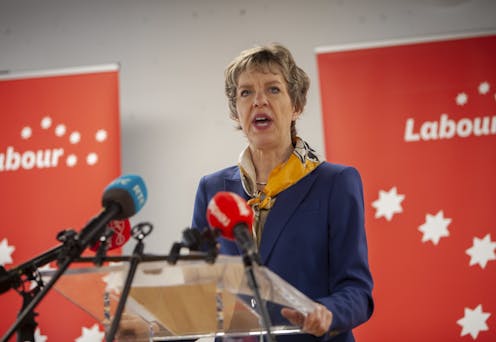
Remember this name: Ivana Bacik. She is the new leader of Ireland’s Labour party – and an energetic voice for change and social justice.
Her paternal grandfather settled in Ireland from Czechoslovakia after the second world war after being imprisoned by the Nazis. Now in her early 50s, Bacik has been pushing for more progressive politics since she was a university student in the late 1980s. That was a time when Ireland was deeply conservative and recalcitrant, when promoting change was a dangerous game. In 1989, Bacik was taken to court and had faced the real prospect of prison for giving out information about abortion as a member of Trinity College Dublin’s Student Union.
It was nearly 30 years later, in 2018, that a referendum was passed that changed the constitution and made abortion legal in Ireland. Today Bacik still recalls how she never forgot women’s voices at the end of the phone line looking for a phone number for a clinic in England. For Bacik, reproductive healthcare was not only a gender issue and a human rights issue but also, always, an economic issue. In this sense, Bacik has always championed intersectional feminism – the idea that women’s lives are constructed by multiple, converging, overlapping systems of oppression.
A barrister by training, Bacik has a fierce intellect and a sharp analytical mind. For many years she has taught criminal law, criminology and penology, as well as feminist theory and law at Trinity College Dublin. And yet she remains one of the most approachable, amicable politicians in Ireland today.
Activism and energy
There are two main aspects that make Bacik’s political outlook distinctive in the Irish political landscape. Her activism and her non-confrontational style. While most politicians have a tendency to take positions motivated by what is more likely to win them votes, Bacik appears to prioritise her principles and integrity. And she looks as comfortable on the streets talking to ordinary people as she is in parliament debating with other elected politicians.
Just like her contemporary Alexandria Ocasio-Cortez in the US, it is impossible to separate Bacik the politician from Bacik the activist. And just like 20th century Marxist Rosa Luxemburg, Bacik lives by the credo that the most revolutionary thing one can do is always to proclaim loudly what is happening.
To be an activist requires passion, commitment and fearlessness, but also humility and generosity. Activism, in particular left-wing activism, is essentially egalitarian. Its anti-hierarchical premises are grounded on the principles of solidarity.
Bacik’s work reflects this, whether on abortion or same-sex marriages, working conditions for freelancers or secular marriage, the rights of immigrants and refugees or the emergency of climate change, the needs of children with additional needs or promoting equality for LGBT+ community.
Interestingly, Bacik is currently chairperson of the Oireachtas (parliamentary) Committee on Gender Equality, working to promote a referendum in 2023 on the outdated and sexist language concerning women in the Irish constitution. Take Article 41.1 on the family, for example, which reads:
the State recognises that by her life within the home, woman gives to the State a support without which the common good cannot be achieved. The State shall, therefore, endeavour to ensure that mothers shall not be obliged by economic necessity to engage in labour to the neglect of their duties in the home.
Inequality is a symptom of structural injustice so work to challenge and change basic social, cultural, economic and legal adages when they are shown to be outdated is vital.
Bacik is also pushing for a universal childcare system, providing community-based support for all. Childcare provision is a major stumbling block towards a more equal, fair society. The prohibitive cost of childcare in Ireland is one reason why many more women in Ireland work in part-time jobs compared to men, a fact that contributes to other ramifications of gender inequality across society. The present childcare system is one of the most obvious and deplorable sources of structural injustice and inequality in Ireland today.
Empathy and strength in leadership
In my work, I have argued that social injustice is best understood in terms of three mutually reinforcing dimensions: maldistribution, exclusion, disempowerment. Those who are economically disadvantaged are also more likely to experience exclusion and, in turn, by being gradually disempowered, are less likely to stand up for their rights. That makes them less likely to become one of the few who benefit from the increasingly inequitable distribution of resources.
As we emerge from a period of politics defined by vulgar and offensive language, simplistic slogans and the confrontational tone, Bacik’s political style is refreshingly decent. She takes an accommodating approach to communication, prioritising listening and giving a voice to the voiceless and defending the cause of diversity and inclusion. In this respect, Bacik is not dissimilar from New Zealand’s prime minister, Jacinda Ardern, who has always claimed that far from reflecting weakness, it takes strength to be an empathetic leader.
The challenge facing all left-wing parties, in Ireland and around the world, is to win back the trust of the people they claim to represent – the least advantaged members of society, who feel marginalised and let down by democratic procedures. According to the most recent opinion poll support for Labour in Ireland now sits at 5%. Other parties on the left in Europe are also lagging behind, from France to Italy to the UK. In the US, a return of Donald Trump to the White House is not beyond the realm of possibility. Bar a few exceptions like Chile, Peru and New Zealand, parties on the Left seem to have lost their voter base.
But at a time when the global economy is struggling with escalating energy costs, and with the daunting prospect of a protracted conflict in Ukraine, voters may be looking for leadership of the kind Bacik is offering. The tide may be turning.
Vittorio Bufacchi is affiliated with Labour Party (Ireland).
This article was originally published on The Conversation. Read the original article.







